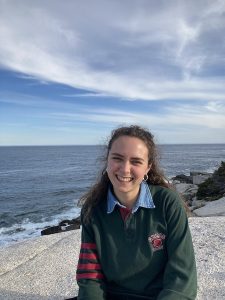M.Sc. Student

| email: oliviamelville@uvic.ca lab phone: 250-472-5427 |
Research Interests
The impact of siliceous rhizaria on the global silica cycle
Silicon is the second most abundant element on Earth, yet many questions about its cycling remain unanswered. Diatoms are highly abundant phytoplankton in ocean ecosystems which have an absolute requirement for silicon to build their cell wall. The abundance of diatoms is often predicted using the concentration of biogenic silica in the water column; however, they are not the only silicifiers in the ocean. Siliceous Rhizaria, previously known as the radiolarians, are zooplankton which also take up silicon to create their skeletons. They are highly understudied but are thought to be important to global silicon cycling. In my master’s project, I will be studying the abundance, distribution and relative contribution to silicon cycling of siliceous Rhizaria compared to diatoms in the Northeast Pacific Ocean. The results from my project will be useful in determining how silicon is cycled and which species are instrumental in this process.
Education
2021 – B.Sc. Honours in Marine Biology with Minor in Chemistry, Dalhousie University
Peer-Reviewed Journal Papers
Conference Presentations
Melville, O. 2021. Identifying critical ratio of C:N:P in food-grade wastewater for growth of diatom Thalassiosira pseudonana. Conference of Dalhousie Oceanography Graduate Students. Dalhousie University, Canada.
Melville, O. 2021. A metagenomic analysis of the Arctic Ocean. Cameron Conference. Dalhousie University, Canada.
Melville, O. 2020. Identifying critical ratio of C:N:P in food-grade wastewater for growth of diatom Thalassiosira pseudonana. Chemical Engineering Conference, Canada.
